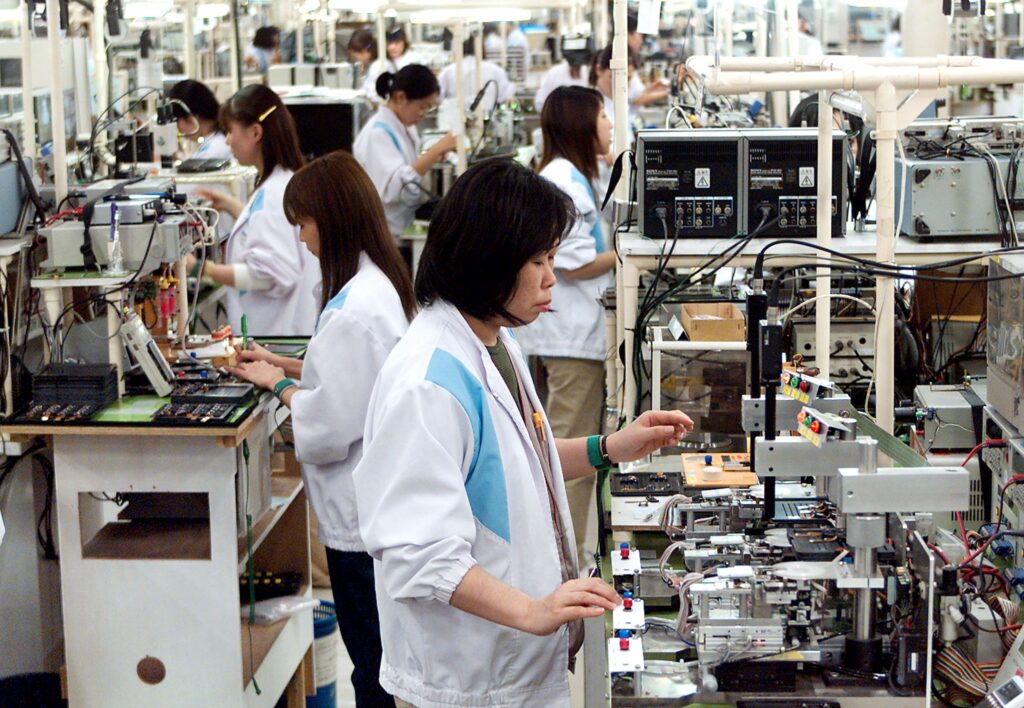
- ARAB NEWS
- 15 Jun 2025

TOKYO: The Japanese government is ramping up initiatives to rectify gender wage disparities, aiming to address structural labor shortages and boost economic growth by empowering women in the workplace and promoting a healthy work-life balance.
According to the labor ministry, the average monthly wage for full-time female workers last year was 262,600 yen, about 75 percent of the 350,900 yen earned by men. The gap is wider than the average of about 88 percent for member countries of the Organization for Economic Cooperation and Development in 2021.
One factor is the so-called L-shaped curve phenomenon, which shows a decline in the proportion of women aged 30 or older who remain in regular employment, primarily due to childbirth and child care responsibilities.
The curve is largely attributed to the difficulties women face in balancing work and child care. Moreover, even when women return to regular employment after taking child care leave, their total length of service at the company is shorter than that of their male colleagues and many women tend to reduce their working hours, leading to pay gaps.
According to the Japan Institute for Labor Policy and Training, the share of managerial positions held by female corporate employees and civil servants stood at 13.2 percent in 2021, underscoring the scarcity of women in high-paying positions.
Many working women follow a career path known as the “mommy track,” where they are deprived of opportunities for career advancement. After returning from child care leave, women are often reassigned to new roles with lighter duties.
In late May this year, a revised child and nursing care leave law was enacted in Japan’s parliament, mandating companies to implement measures that promote flexible work styles.
The government is advocating wider adoption of remote work and shorter working hours, while encouraging men to take child care leave. The aim is to help alleviate the disproportionate burdens of household chores and child care that are often borne by women, despite the rise in double-income households.
In addition, the government is looking at amending the women’s empowerment promotion law to expand the range of businesses required to disclose information on wage gaps, lowering the threshold from companies with 301 or more employees to those with 101 or more.
In an interim report released on June 5, the government’s project team promoting women’s empowerment in professional life, chaired by Wakako Yata, special adviser to the prime minister, identified “unconscious bias” as a significant factor contributing to the gender pay gaps. Unconscious biases held by women themselves include the belief that “I can’t play that role.”
Officials noted that not only men but also women are still influenced by the deep-rooted belief that women should prioritize family roles and occupy non-career positions. As a result, many women are not inclined to seek career advancement, the officials said.
Japanese companies are working to eliminate such preconceptions by intensifying efforts to train female managers.
In the fiscal year to last March, sports club operator Renaissance Inc. launched “cross-mentoring” training sessions, allowing participants to share their concerns with female executives from other companies who serve as role models. Renaissance implemented the initiative in collaboration with human resources service provider Adecco and Panasonic Connect Co., which mainly engages in information technology businesses.
In the training sessions, section chief-level managers have one-on-one interviews with department chief- or executive-level workers for about four months, transcending individual corporate boundaries.
One participant said, “I was able to seek advice on issues that are difficult to discuss within the company.” Responses to a post-training questionnaire included a comment that “I am more motivated than ever to pursue a promotion.”
“We hope that interactions with people outside the company will provide broader perspectives and help participants overcome their own prejudices,” said Noriko Yoshiba, deputy manager of the diversity, equity and inclusion promotion team at Renaissance’s human resources department.
In the current fiscal year, Renaissance is conducting training sessions in partnership with four companies, continuing its steady effort to foster changes in women’s mind-sets.
JIJI Press